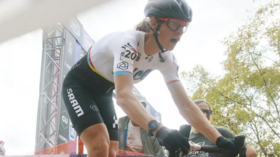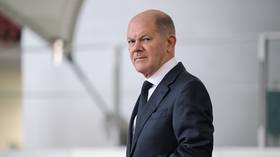Trans cyclist takes first place in US women’s race

Austin Killips, 26, a US cyclist who was born male but has since transitioned to female, took first place this past weekend in the female elite division at the Verge Northampton International Cyclocross in Massachusetts.
Killips triumphed with a time of 50:25, one second clear of fellow racer Ava Holmgren. Lizzy Gunwales came in third position with a time of 50:31 in the event, which features a mix of on- and off-road cycling as well as various obstacles and technical challenges.
This comes months after the Union Cycliste Internationale (UCI) amended its regulations for transgender athletes to require applicants to display reduced levels of testosterone for a period of 24 months, 12 months more than the previous guidelines requested.
The UCI also lowered the permissible amount of plasma testosterone level in its transgender athletes, which they say brings it in line with the “maximum testosterone level found in 99.99 percent of the female population.”
Online records suggest that Killips has come in first position in 17 of 57 races in which she was eligible. She has also placed in the top half in 47 races across the last three years.
It has previously been suggested that Killips’ success is due to her analytical approach to the sport rather than any perceived physical advantages.
“I approach the sport scientifically. I am a student of the sport,” Killips said.
“You need to have an affinity and passion for it to be spending so much time watching races and analyzing. Observation is a huge part of getting better. There are many resources like the course previews and years of coverage of racing.”
Today at Northampton International Cyclocross Day 1, Austin Killips took the win in the elite women's field#SaveWomensSportspic.twitter.com/qBztktJLp4
— 🚲 (@i_heart__bikes) November 12, 2022
Furthermore, Killips adds that she has received significant support from her peers in the sport, and says that she is proud to help advance the sport for all women regardless of their gender identity.
“I haven’t raced that much abroad so my experience is mostly in the domestic scene,” she said.
“We have a strong sense of community and solidarity in the US pro peloton. Bike racing is so very small in the USA and with a lot of overlap between the road and cyclocross peloton. I feel the solidarity between us all to help progress the sport for women, whether those are trans women or not.”
Killips added that there remains significant opposition to transgender athletes across various disciplines – something she claims is little more than a politically-motivated culture war.
“It’s half of the country now involved in this culture war. It’s a hot-button issue in right-wing politics. Thinking in terms of politics, it’s hard to understand how a boycott will result in change,” she said.
“I am not an activist but I can’t divorce myself from my identity and how I will be perceived by others. There are trans athletes and folks that I connect with. There are people coming up to me telling me that what I do is meaningful and matters to them.”













